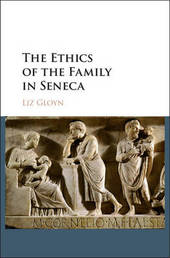
|
The Ethics of the Family in Seneca
Hardback
Main Details
| Title |
The Ethics of the Family in Seneca
|
| Authors and Contributors |
By (author) Liz Gloyn
|
| Physical Properties |
| Format:Hardback | | Pages:258 | | Dimensions(mm): Height 235,Width 158 |
|
| Category/Genre | Philosophy
Western philosophy - Ancient to c 500
Ethics and moral philosophy |
|---|
| ISBN/Barcode |
9781107145474
|
| Classifications | Dewey:173 173.092 |
|---|
| Audience | | Professional & Vocational | |
|---|
| Illustrations |
1 Line drawings, black and white
|
|
Publishing Details |
| Publisher |
Cambridge University Press
|
| Imprint |
Cambridge University Press
|
| Publication Date |
15 February 2017 |
| Publication Country |
United Kingdom
|
Description
This book is the first extensive study of the role of the family in the work of Seneca. It offers a new way of reading philosophy that combines philosophical analysis with social, cultural and historical factors to bring out the ways in which Stoicism presents itself as in tune with the universe. The family serves a central role in an individual's moral development - both the family as conventionally understood, and the wider conceptual family which Stoicism constructs. Innovative readings of Seneca's work bring out the importance of the family to his thought and how it interacts with other Stoic doctrines. We learn how to be virtuous from observing and imitating our family, who can be biological relatives or people we choose as our intellectual ancestors. The Ethics of the Family in Seneca will be of particular interest to researchers in Roman Stoicism, imperial culture and the history of the family.
Author Biography
Liz Gloyn is Lecturer in Classics at Royal Holloway, University of London. As well as Latin literature and Roman philosophy, her research interests also include the history of women as professional classicists and the role of classical monsters in modern popular culture.
Reviews'This is a significant achievement and will be warmly appreciated by students of Seneca's thought and of Roman social history alike.' Brad Inwood, Bryn Mawr Classical Review
|